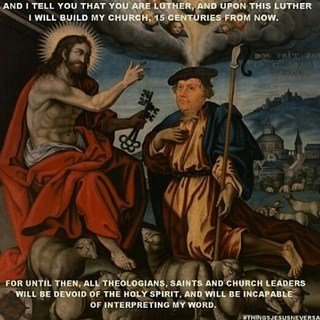Martin Luther thought that what James wrote didn't express the "nature of the Gospel," that it appeared to contradict Paul's statements about justification by faith, and that it didn't directly mention Christ. He was wrong about it not expressing the nature of the Gospel, and about it contradicting Paul's statements. He didn't understand James 2 in particular correctly, namely that the Christian's good works are the natural result and outward expression of the living faith Christians have been given, that if we say we have God-given faith but there are no works that are the outward expression of the faith within, then the faith that person says they have is a dead faith. Nobody is perfect. :)I'd also like to add that Martin Luther wanted to remove the book of James from Canon because it spoke about doing works...or...works having something to do with justification.
Ah, well, if it is not of the Holy Spirit, yes, which is actually an argument for sola Scriptura... <smile>I'd also add that ANY new teaching from the early church can be considered as false.
As I have said, John Calvin himself said ~ of himself ~ that "Augustine is so much at one with me that, if I wished to write a confession of my faith, it would abundantly satisfy me to quote wholesale from his writings." And to that point, on average, one of every four pages written in John Calvin's two-volume Institutes of the Christian Religion contain direct quotes from Augustine. So, in understanding John Calvin to be correct regarding Scripture, that same person is also necessarily understanding Augustine ~ who lived approximately 1100 years before Calvin and only 300 to 400 years after Christ ~ to be correct, so much as to say the Calvinist is also necessarily to be an Augustinian. <smile>Including the teachings of Augustine of Hippo, which the reformed faith uses as an excuse to follow the teachings of a mere man, John Calvin.
And Paul was a murderous non-Christian before the events described in Acts 9... God can certainly change the hearts of any one of His creatures...Augustine spent 10 years in a gnostic manachean sect before joining the CC.
Well, Paul talks about predestination, so we all have to believe there truly is such a thing, because now we're talking about God's Word...He brought some of his gnostic beliefs with him including:
Predestination
Absence of free will
And "absence of free will..." It depends on how we look at it, actually:
There is a certain sense ~ meaning humanly speaking, from our perspective ~ our will is free. Certainly, we make our own decisions about things, so yes, we are free to think what we want to think and decide what we want to decide.
However, from a different perspective, all sorts of things influence us to think or do anything we do, even causing us to change our minds or alter the actions we might have taken otherwise. So in that sense there is no such thing, even humanly speaking, as free will... something from outside of us always determines and even in a certain sense dictates what we think or do.
With regard to salvation and whose will we actually do, Jesus is very clear that people always do the will of the one who (or Who) is their father, who (or Who) they are of, either the devil or God the Father. If the person is still dead in his or her sin, his or her father is the devil, he or she is of the devil, and he or she will always do the will of the devil. But, if the person is born again of the Spirit, then he or she is of God, and he or she will always do the will of God. There is no in-between or "neutral," and in that sense no "free." We are either slaves to sin or slaves to righteousness.
So odd that you say that......did a good job with Pelagius.
The Catholic Church does have some good things about it... :) Well, pretty good anyway......the CC accepted his teaching on infant baptism...
I'm really not sure how the Catholic Church understands "double predestination," to be quite honest. And I don't really care; God chose who He chose from before the foundation of the world, and predestined these for adoption to Himself as sons through Jesus Christ, according to the purpose of His will (Paul, Ephesians 1). This is the only kind of predestination spoken of throughout Scripture. However, we can say ~ and really have to ~ that God purposely chose who He chose, as Paul is very clear about that, and that necessarily means that not choosing those whom he did not choose was also purposeful. And that fits perfectly with what this same Paul says in Romans 9, that "(God) has mercy on whomever He wills, and (God) hardens whomever He wills" (Romans 9:18)....the notion of double predestination, which is what John Calvin taught and which in no way can be compatible to the teachings of the NT.
Maybe, but I doubt he was the only one who believed as he did. The inference I drew above really has to be attributed to Paul himself.Augustine was the only authoritative person in the CC to teach such...
<eye roll>NO ECF BEFORE HIM ever taught such incorrect doctrine and/or changed the nature of God the way that the reformed have. They seem to proudly credit these incorrect teachings to a church (via Augustine) they otherwise loathe.
Grace and peace to you.



